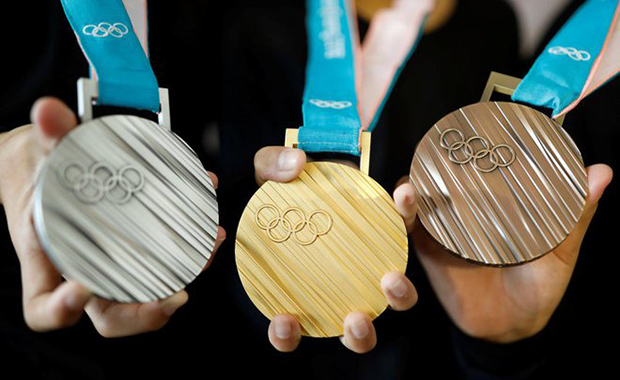Success Advice
9 Successful Characteristics of Olympic Athletes That You Need to Replicate

Successful athletes, just like any successful entrepreneur, have common characteristics that have helped them on their path in becoming the best version of themselves within their chosen discipline. Through my experience coaching talented athletes across the world in a range of sports, I have put together the top personal characteristics which we can learn from the most successful athletes.
Here are 9 of the most successful characteristics of olympic athletes:
1. Consistency
One of the biggest virtues I have seen in top athletes I have trained is that they are very consistent. They consistently turn-up to each training session not for 3 months, not for 6 months but for years and years. It is a part of there life even before they are successful and thus are motivated by more than just success.
2. Enjoyment
To be consistent you need to enjoy what you do. You need to enjoy training and competing otherwise it is going to be a tough road when you have to make big sacrifices in other areas of your life and maybe not making any real money for 10 to 15 years. This enjoyment makes it easier to perform the hard sessions you do not enjoy.
3. Sacrifice & Discipline
As we go through our teens and 20’s, our experience in life broadens, and we are given more responsibility in the choices we make. As an athlete you have to turn away from what most of your friends will be doing and walk a different path from partying, drinking, and common socialising activities. One rower comes to mind who would wake up at 5am everyday to cycle 1 hour then row for another 2 hours.
He would then go and study medicine for a full 9 to 5, followed by another training session. His afternoons would be consist of studying or working at a local bar to pay for his rent. I was always impressed by this man’s discipline and commitment to his goals. He is now rowing in the senior Ireland heavyweight rowing squad aiming to be the first Heavyweight irish squad in the next Olympics.
“Discipline is the bridge between goals and accomplishment.” – Jim Rohn
4. Social Support
As a result, you must find social support and connection within your sports. Those with good friends in their training squads are much more likely to stay consistent. The support of family means that they can commit, get rides of mum and dad until they have a car, get a cooked meal straight after training. If you are not involved in sports it can be challenging for some people to understand an individual’s sacrifice and commitment so it is important to surround yourself with friends who do understand this.
5. Coach-Athlete Relationship
The coach athlete relationship changes from individual to individual. It is important that communication is open and that the coach and athletes are fully aware of each person’s responsibilities. When you can see a good coach-athlete relationship you can see that they both share the same goal but the coach must manage and understand how to motivate the athlete through periods of adversity.
As a coach, we are motivated by an athlete who is committed and listens well, I am personally inspired by someone’s heart and kind personality. I would always go the extra mile if I felt the individual was a good and honest person.
6. Delegation
An athlete needs to focus on turning up and getting the work done. If they have to then focus on what they will do at training, what they will eat, and how well they are progressing then stress and time spent on these things builds up.
When another coach or practitioner can take these things away from the athlete, then they are free to focus on their job and athletic development. The reduction in stress also improves the adaptation to training as the individual needs to be in a relaxed state to repair and grow.
7. Clear Long-term Goal
To avoid the immediate pleasure of eating badly, partying or just not doing an arduous training session, an individual needs to have a clear long-term goal in mind. This goal will allow them to consciously and unconsciously make the right decision when encountering a crossroads. They have to be committed to this goal as they will have to resist the temptation of many short-term pleasures along the way. This in turn allows you to create better habits.
8. Work-ethic
Work-ethic is the quality of working hard and putting in the effort because you enjoy giving something 100% more than the success or failure of the event. This quality is essential in any athlete and would be a natural personality trait. Work-ethic combined with a natural affinity for an activity is the perfect combination.
“And where I excel is ridiculous, sickening, work ethic. You know, while the other guy’s sleeping? I’m working.” – Will Smith
9. Internal Motivation
Internal motivation is a drive which comes from within, because you are doing the action for the internal reward (feeling proud, etc.) and for yourself. On the other hand, external motivation is when someone else is motivating you and you are doing the action for a external reward (money, etc.).
Internal motivation is more consistent and is better at overcoming adversity than someone who is motivated by external motivation. This is also important as an athlete may spend many years before he or she starts to make any money and other external rewards.
We can learn many qualities from the traits of successful athletes and transfer them into different areas of our life. Whether it be your business or your relationships, showing these qualities will ensure growth in all aspects of your life.
Which one of these 9 characteristics resonates most with you? Comment below and let us know!
Success Advice
How to Choose the Best Affiliate Programs for Your Blog
If you follow these steps, you can create an affiliate marketing plan that makes money, fits well with your content, and connects with your readers

Picking the right affiliate programs for your blog is really important. It can make a big difference in how much money you can make and how much your readers get out of your blog. With so many choices out there, deciding which ones to go with can be tricky.
This guide is here to make it easier for you. It will give you clear steps and helpful tips to choose affiliate programs that fit well with what your blog is about, what your readers like, and what you stand for.
For more articles on this theme, please head over to this blog https://blog.partners1xbet.com/.
Understanding Affiliate Marketing
Before you start picking affiliate programs, it’s important to really understand what affiliate marketing is and how it works.
Basically, affiliate marketing is when you promote a product or service on your blog, and then you get paid a little bit every time someone buys something or does something because you recommended it.
It’s great for both the person selling the product and the blogger, because the seller gets more sales with low risk, and the blogger can make money from their blog.
How to Choose the Right Affiliate Programs for Your Blog
1. Assess Your Niche and Audience
The key to doing well in affiliate marketing starts with really knowing what your blog is about and who reads it. Consider the following:
- Your blog’s content: What topics do you cover? Ensure the products or services you promote are relevant.
- Your audience’s interests and needs: What solutions are they seeking? Choose affiliate programs that offer products or services that solve their problems or enhance their lives.
2. Research Potential Affiliate Programs
Once you know what your blog is about and what your readers want, start looking for affiliate programs. Choose ones that are well-known for good products, great customer service, and helpful support for affiliates. Resources to find these programs include:
- Affiliate networks like ShareASale, Commission Junction, and ClickBank.
- Direct searches for “[Your Niche] affiliate programs” in search engines.
- Recommendations from other bloggers in your niche.
3. Evaluate the Commission Structure
The commission structure is a critical factor to consider. Look for programs that offer competitive rates that make your efforts worthwhile. Consider:
- The percentage of commission per sale.
- Whether the program offers a flat rate per action (e.g., per sign-up).
- The cookie duration, which affects how long after a click you can earn commissions on sales.
4. Consider the Program’s Reputation and Sureness
Join affiliate programs with a solid reputation for quality and sureness. This not only ensures that you’re promoting good products but also that you’ll be paid on time. You can:
- Read reviews from other affiliates.
- Check the program’s history and background.
- Look for any complaints or issues reported online.
5. Analyze the Support and Resources Offered
A good affiliate program gives you things like ads to use, training on their products, and helpful managers. Having access to these resources can really help you do a better job at promoting their products.
6. Understand the Terms and Conditions
Before signing up, thoroughly review the program’s terms and conditions. Pay close attention to:
- Payment thresholds and methods.
- Any restrictions on how you can promote their products.
- The program’s policy on affiliate marketing on social media platforms.
7. Test the Product or Service
If possible, test the product or service before promoting it. This firsthand experience allows you to offer genuine charge and build trust with your audience.
8. Look for Recurring Commission Opportunities
Some affiliate programs pay you again and again for subscriptions or services that charge fees regularly. These can provide a more stable income compared to one-time sales commissions.
Implementing Your Choice
After choosing the best affiliate programs, the next step is to smoothly include your affiliate marketing in your content plan. This includes:
- Creating valuable content that naturally incorporates affiliate links.
- Disclosing your affiliate affairs transparently to maintain trust with your audience.
- Tracking your results to understand what works best for your audience and adjusting your strategy accordingly.
Picking the best affiliate programs for your blog involves careful planning, research, and making sure they match what your audience likes and needs.
If you follow these steps, you can create an affiliate marketing plan that makes money, fits well with your content, and connects with your readers.
The real key to doing well with affiliate marketing isn’t just about the products you talk about, but also how much your audience trusts and values your advice.
With enough time, patience, and hard work, your blog can grow into a successful space that earns a good amount of affiliate money and helps your readers choose the right products.
Success Advice
The Power of Ethical Leadership: How Integrity Drives Success
By leading with integrity and ethics, leaders create an environment where employees feel excited to come to work

What differentiates a positive organizational culture that enjoys a clean reputation and long-term success from a toxic culture drowning in scandals, mistrust, and legal fines? (more…)
Success Advice
10 Landing Page Hacks Experts Are Using to Generate Leads
Crafting a landing page that converts is both an art and a science

If you are in the online marketing world, you know the importance of a high-quality landing page. It’s like a secret sauce that can turn a casual user into a solid lead. I will walk you through ten great tips that have worked wonders for me and could do the same for you in creating landing pages that generate leads. (more…)
Success Advice
An Easy to Follow 8 Step Strategy for Creative Problem Solving
A complete process of creative problem-solving encompasses finding problems, developing creative solutions, and implementing your solutions

No matter where you look around the world today, entrepreneurs face a common challenge: The need to stand out from their competitors and win over customers. (more…)
-

 Life4 weeks ago
Life4 weeks agoThe Power of Elevating Others: Steps to Change Your Life for the Better
-

 Life4 weeks ago
Life4 weeks agoThe Best Techniques to Boosting Your Memory in a Busy World
-

 Success Advice3 weeks ago
Success Advice3 weeks agoAn Easy to Follow 8 Step Strategy for Creative Problem Solving
-

 Entrepreneurs4 weeks ago
Entrepreneurs4 weeks agoCrisis-Proof Your Business Now: Essential Strategies for Every Entrepreneur
-

 Success Advice3 weeks ago
Success Advice3 weeks ago10 Landing Page Hacks Experts Are Using to Generate Leads
-

 Entrepreneurs2 weeks ago
Entrepreneurs2 weeks agoThe Mindset Shifts Required to Become a Successful Online Entrepreneur
-

 Success Advice2 weeks ago
Success Advice2 weeks agoThe Power of Ethical Leadership: How Integrity Drives Success
-

 Entrepreneurs2 weeks ago
Entrepreneurs2 weeks ago6 Hacks to Boost Your Productivity as a Business Owner





























